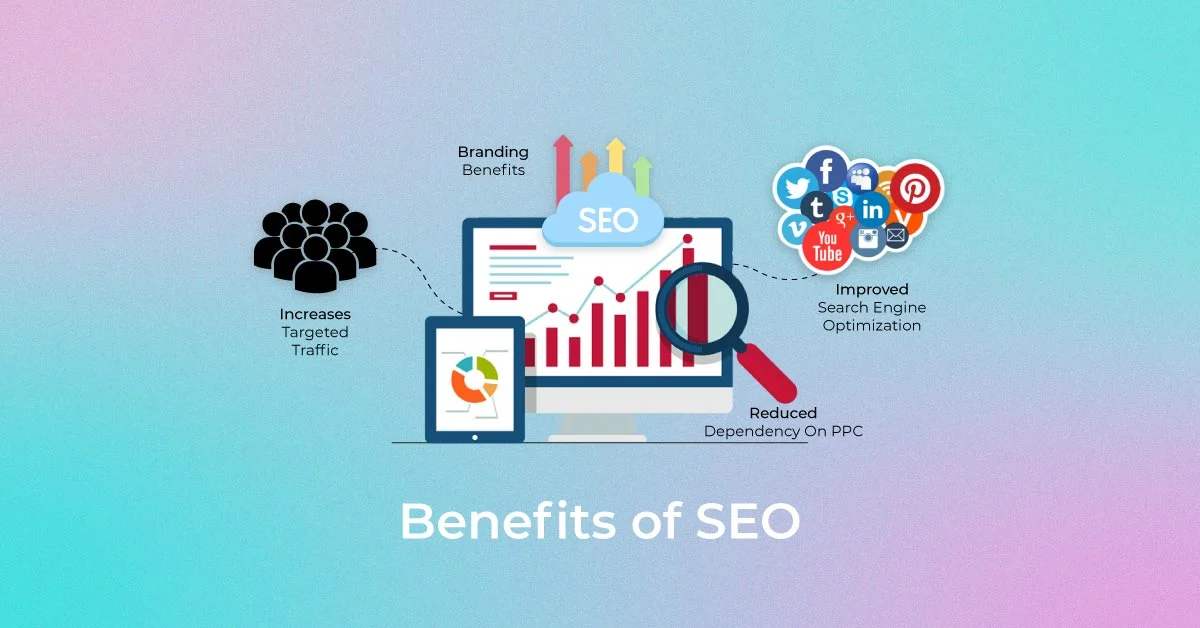Technical SEO ranking factors encompasses various factors such as website speed, mobile-friendliness, security, and proper indexing, all of which contribute to a site’s overall performance and visibility in search engine results. Understanding and implementing these technical SEO factors is crucial for creating a robust foundation that supports other SEO efforts, ultimately leading to higher search rankings and a better user experience. Refer to Optimalmk article below.
What are the benefits of standard SEO techniques?
Standard SEO techniques offer a variety of benefits for websites and online businesses. Here are some of the key advantages:
- Increased Organic Traffic: Properly optimized content helps your website rank higher in search engine results, driving more organic traffic to your site.
- Improved User Experience: SEO involves optimizing page load speed, mobile-friendliness, and creating high-quality content, all of which contribute to a better user experience.
- Higher Conversion Rates: By attracting targeted traffic from users searching for specific keywords related to your content, you are more likely to convert visitors into customers or subscribers.
- Cost-Effective Marketing: Unlike paid advertising, organic search traffic is free. While SEO requires an investment of time and resources, it generally provides a higher return on investment in the long run.
- Brand Credibility and Trust: Websites that rank higher in search results are often perceived as more credible and trustworthy by users, which can enhance your brand reputation.
- Competitive Advantage: Implementing effective SEO strategies can help you stay ahead of competitors who may not be optimizing their websites as effectively.
- Better Local Search Visibility: For businesses with physical locations, local SEO techniques can improve visibility in local search results, attracting more local customers.
- Long-Term Results: Unlike short-term marketing tactics, the benefits of SEO can last for a long time, with ongoing optimizations continuing to pay off over time.
- Insights into Customer Behavior: SEO tools and analytics provide valuable data on user behavior, search patterns, and preferences, helping you refine your content and marketing strategies.
- Enhanced Site Usability: SEO techniques such as improving navigation and site architecture make it easier for users to find the information they need, leading to higher engagement and satisfaction.

By leveraging standard SEO techniques, you can enhance your website’s visibility, user experience, and overall effectiveness, leading to sustainable growth and success.
Technical SEO ranking factors
Technical SEO is a critical aspect of optimizing a website to improve its search engine rankings. Unlike on-page and off-page SEO, which focus on content and external signals, technical SEO deals with the backend structure and functionality of a website. Ensuring that your website adheres to technical SEO best practices can significantly enhance its visibility and performance in search engine results. Here are some key technical SEO ranking factors:
One of the most important technical SEO ranking factors is website speed. Search engines, particularly Google, prioritize fast-loading websites because they offer a better user experience. A slow website can frustrate users and increase bounce rates, negatively impacting your search rankings. To improve website speed, consider optimizing images, leveraging browser caching, and using content delivery networks (CDNs). Tools like Google PageSpeed Insights can help identify areas for improvement and provide actionable recommendations.

Mobile-friendliness is another crucial technical SEO ranking factor. With the majority of internet users accessing websites via mobile devices, search engines have shifted to a mobile-first indexing approach. This means that the mobile version of your website is considered the primary version for ranking purposes. Ensuring your website is responsive and offers a seamless experience on all devices is essential. This includes optimizing font sizes, button placements, and navigation for mobile users. Google’s Mobile-Friendly Test tool can help evaluate your site’s mobile compatibility.
Structured data, also known as schema markup, plays a significant role in helping search engines understand the content of your website. By adding structured data to your web pages, you can provide search engines with detailed information about your content, such as product details, reviews, events, and more. This not only helps improve your search rankings but can also enhance your search result listings with rich snippets, increasing click-through rates. Tools like Google’s Structured Data Testing Tool can help ensure your markup is correctly implemented.
Another key technical SEO factor is having a secure website. HTTPS encryption is a ranking signal used by Google to prioritize secure websites over non-secure ones. A secure website ensures that data exchanged between the user’s browser and the server is encrypted and protected from potential threats. Implementing an SSL certificate and ensuring all pages on your site are served over HTTPS is essential for both security and SEO.
Properly configured XML sitemaps and robots.txt files are fundamental components of technical SEO. An XML sitemap helps search engines discover and index your website’s pages more efficiently by providing a roadmap of your site’s structure. This is particularly important for larger websites with complex architectures. On the other hand, a robots.txt file guides search engines on which pages to crawl and index. Properly configuring these files ensures that search engines can access your important content while avoiding duplicate or low-value pages.
Lastly, addressing crawl errors and broken links is vital for maintaining a healthy website. Crawl errors occur when search engines encounter problems accessing your web pages. These errors can be identified using tools like Google Search Console, which provides detailed reports on crawl issues. Regularly monitoring and fixing crawl errors, as well as identifying and removing broken links, ensures that search engines can efficiently navigate and index your site, improving its overall SEO performance.
In conclusion, technical SEO encompasses a wide range of factors that collectively enhance a website’s search engine performance. By focusing on aspects such as website speed, mobile-friendliness, structured data, security, and proper indexing, you can create a solid foundation for your SEO efforts. Regularly auditing and optimizing these technical elements will not only improve your search rankings but also provide a better user experience, driving long-term success for your website.
Contact Info
Information about “Technical SEO ranking factors” hopes to provide you with additional necessary knowledge. At optimal FB, there is a team of highly qualified and experienced staff and experts who will provide facebook business account as well as support when you run Facebook ads. Contact us via phone number: +84 564 104 104.


